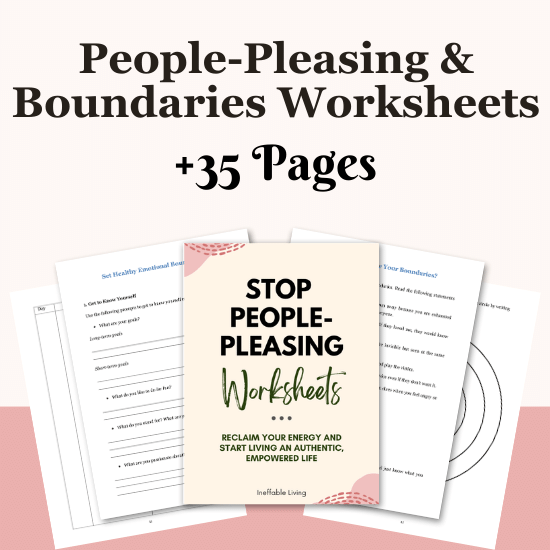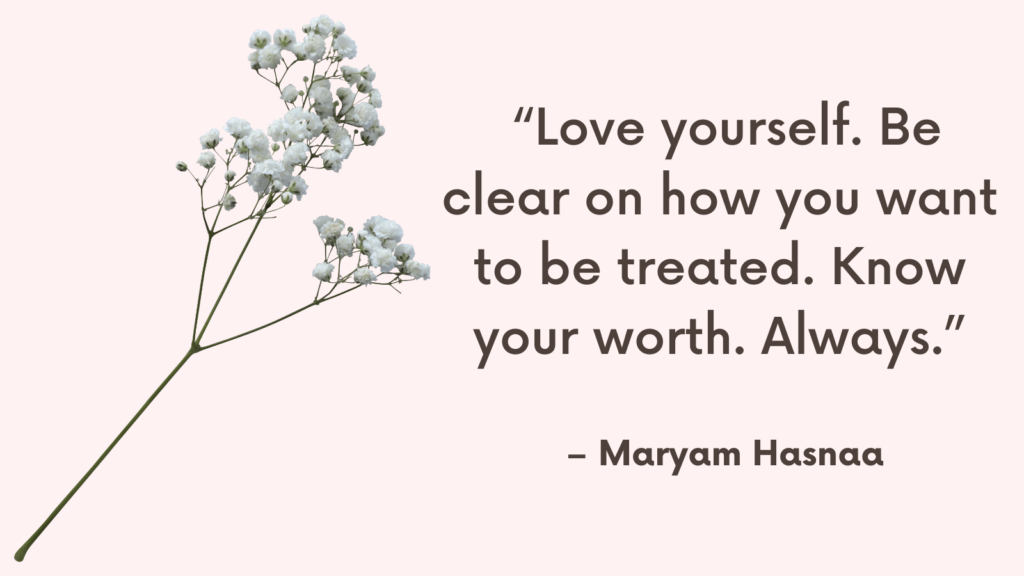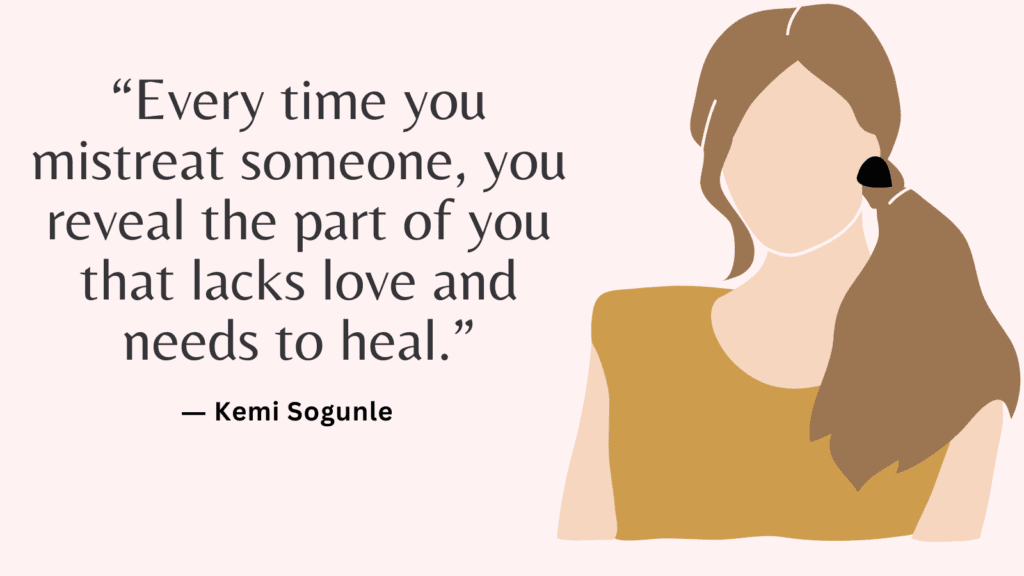The holiday season is often a time of joy, celebration, and connection, but it can also bring stress, overwhelm, and pressure.
With increased social gatherings, family obligations, and expectations, maintaining healthy boundaries becomes essential for preserving your mental and emotional well-being.
This guide will help you navigate boundaries during the holidays, ensuring that you can enjoy the season without sacrificing your own needs and comfort.
Examples of Boundaries During the Holidays
- I will say no to events that drain me.
- I will set a budget for holiday spending and stick to it.
- I will limit how long I stay at family gatherings.
- I will choose which traditions matter most to me.
- I will prioritize rest over overcommitting.
- I will not explain or justify my personal choices.
- I will avoid topics I know will lead to conflict.
- I will take time for myself each day, even if it’s just 10 minutes.
- I will decline hosting if I’m not up for it.
- I will plan quiet time after busy gatherings.
- I will limit alcohol or substances if that feels right for me.
- I will let go of the need to make everyone happy.
- I will spend time with people who make me feel safe.
- I will allow myself to grieve if the holidays feel hard.
- I will honor my dietary needs without guilt.
- I will not tolerate rude or intrusive comments.
- I will take breaks from social media if needed.
- I will avoid comparing my holidays to others.
- I will ask for help instead of doing everything myself.
- I will not feel pressured to explain why I’m single/married/childless/etc.
- I will carve out time for spiritual or reflective practices.
- I will remember I can leave an event early if I need to.
- I will stick to reasonable bedtime routines.
- I will approach the season with self-compassion, not perfection.
How to Identify Your Boundaries During the Holidays?
The holidays can bring joy, but they can also bring stress, overwhelm, and emotional exhaustion — especially if you’re not clear on your boundaries. Identifying what you need and where your limits are helps you navigate family gatherings, social events, and obligations without sacrificing your well-being.
1. Notice What Makes You Feel Overwhelmed
Pay attention to which holiday activities, gatherings, or traditions leave you feeling drained or anxious. Overwhelm is often a sign that a boundary needs to be set or strengthened.
2. Define Your Emotional Capacity
Be honest with yourself about how much social time or emotional energy you can give. Do you need downtime between events? Do you feel emotionally safe with everyone you’re expected to see? Clarify what you can truly handle.
3. Decide How Much Time You Can Commit
Boundaries aren’t just emotional — they’re also about time. Decide in advance how long you’re willing to stay at gatherings, how many events you can realistically attend, and when you need to leave to protect your energy.
4. Identify Financial Limits
Holiday spending can easily spiral out of control. Set clear financial boundaries: how much you’re willing to spend on gifts, travel, meals, or donations — and stick to it without guilt or pressure.
5. Clarify What Traditions Still Work for You
Not every tradition needs to be kept. Ask yourself: Which rituals or activities still bring meaning or joy? Which feel draining, outdated, or forced? You have the right to adjust or let go of traditions that no longer serve you.
6. Recognize Who Feels Emotionally Safe
Not every family member or friend is emotionally safe to be around. Identify who supports and respects you — and who tends to criticize, dismiss, or stress you out. Plan how to limit exposure to unsafe dynamics.
7. Set Boundaries Around Conversations
The holidays can invite unwanted topics — from personal questions to political debates. Decide in advance what topics you’re unwilling to engage in and practice phrases to gently redirect or exit those conversations.
8. Protect Your Rest and Alone Time
Amid all the social and family demands, you still need rest. Identify how much quiet or solo time you need to recharge and make it a non-negotiable part of your holiday plan.
9. Tune Into Your Body’s Signals
Your body often signals when you’re nearing your limit: headaches, tension, irritability, or exhaustion. Learn to notice these cues early so you can pause, rest, or step away before burnout hits.
10. Remember That Boundaries Are Acts of Care
Boundaries aren’t about being difficult — they’re about protecting your mental and emotional health so you can show up meaningfully. Setting limits allows you to participate in the holidays with presence, not resentment.
How to Set Boundaries During the Holidays?
1. Set Clear Expectations with Family and Friends
Before the holidays begin, have open and honest conversations with family and friends about your availability, limits, and needs.
Clearly communicate what you are comfortable with, such as how much time you can spend together, topics of conversation you’d like to avoid, and any personal space you require.
2. Prioritize Your Own Well-Being
Make self-care a priority during the holidays by scheduling time for rest, relaxation, and activities that replenish your energy.
This might include taking breaks during gatherings, saying no to events that feel overwhelming, or setting aside quiet time each day.
Related: How to Identify and Set Non Negotiable Boundaries?
3. Learn to Say No
Practice saying no to invitations, requests, or obligations that don’t align with your comfort level or capacity.
Be polite but firm in your refusal, and remember that it’s okay to prioritize your own needs.
4. Manage Financial Boundaries
Set a budget for holiday spending and stick to it.
Communicate your financial boundaries to loved ones, especially if you feel pressured to spend beyond your means on gifts, events, or travel.
5. Limit Social Media Use
Set boundaries around your social media use during the holidays, such as limiting the time you spend online or avoiding platforms that trigger stress or comparison.
Consider taking a break from social media altogether if it feels overwhelming.
Related: Healthy Boundaries Quiz (+Free PDF Worksheets)
6. Respect Personal Space and Alone Time
If you’re spending extended time with family or friends, make it clear that you may need alone time to recharge.
Set aside specific periods during the day for personal space, and communicate this need to others in advance.
7. Establish Boundaries Around Conversations
If certain topics of conversation make you uncomfortable (e.g., politics, religion, or personal matters), set boundaries around these discussions.
Politely steer the conversation in a different direction or excuse yourself if necessary.
8. Plan for Difficult Interactions
If you anticipate challenging interactions with certain family members or friends, plan ahead.
Set limits on how much time you’ll spend with them, and prepare strategies for managing your emotions or exiting the situation if needed.
Related: What Do Boundaries Sound Like? + 35 Boundaries Examples
9. Communicate Travel Boundaries
If you’re traveling for the holidays, set boundaries around your travel plans, such as arrival and departure times, accommodations, and how much time you’ll spend with others.
Communicate these plans clearly to avoid misunderstandings.
10. Be Mindful of Alcohol and Food Boundaries
Set personal boundaries around alcohol and food consumption during holiday gatherings.
This might include limiting alcohol intake, avoiding certain foods, or declining pressure to eat or drink more than you’re comfortable with.
11. Set Time Boundaries
Decide in advance how much time you’re willing to spend at holiday events and stick to it.
This could mean arriving late, leaving early, or setting a firm end time for visits.
12. Practice Compassionate Boundary Setting
When setting boundaries with others, do so with kindness and compassion.
Use “I” statements to express your needs without blaming or criticizing, and listen to others’ needs as well.
Related: +100 Examples of Boundary Violations & How to Deal With It
13. Prepare for Pushback
Be prepared for the possibility that others may not immediately respect or understand your boundaries.
Stay firm and consistent in your boundaries, and remind yourself that it’s okay to prioritize your own well-being.
14. Reflect and Adjust
After each holiday event or gathering, take time to reflect on how well your boundaries were respected and how you felt.
Adjust your boundaries as needed for future events to better align with your comfort and needs.
Related: Top 5 Tips On How To Be Assertive Without Being Rude

Conclusion
The holiday season can be a wonderful time of connection and celebration, but it’s important to navigate it with healthy boundaries to protect your well-being.
By setting clear expectations, prioritizing self-care, and being mindful of your limits, you can enjoy the holidays on your own terms.
Remember, boundaries are not about shutting people out—they’re about creating a space where you can thrive and truly enjoy the season.



